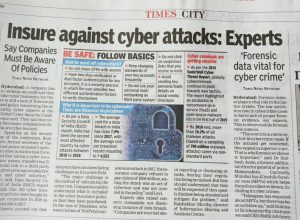Dear Readers,
today we have another interview for you. This time we spoke with Rachiyta Jain, Co-Founder of The Cyber Blog India. Rachiyta told us about blogging, cyber security awareness in India and using secure passwords. Dive in!
[eForensics Magazine]: Hello Rachiyta, how have you been doing? Can you introduce yourself to our readers?
[Rachiyta Jain]: Thank you Marta, first of all for getting in touch. I am the Co-founder of The Cyber Blog India and pursuing an undergraduate course in Integrated B.Tech Computer Science Engineering + LLB (Hons.) with specialisation in Cyber Law. I am engaged in various activities like legal consulting, technical and legal writing, blog management and public speaking.
[eFM]: Tell us something about “The Cyber Blog India”. Is it only a blog?
[RJ]: The name “The Cyber Blog India” gets everybody confused. We started as a blog initially but went on to expanding in other directions as well. We at Cyber Blog India are of the opinion that “Awareness and sensitization is the key to cyber safety.” Thus, apart from blogging, we go to schools, colleges and organisations right from grassroots to urban areas spreading the word about how to stay safe. We offer consultancy services to advocates, police and people in general and in fact, we have trained law enforcement agencies in India. We have a dedicated WhatsApp helpline service which keeps our followers posted on the go and often people contact us for guidance if they themselves or someone they know needs help. Recently, we also started a documentation drive under the name “My Cyber Crime Story” to create a database of real life stories of cyber crime victims. You can find the page on Facebook.
The start was a little rough because being students, we weren’t taken seriously for our offline engagements. However, within first 6 months, we won our first National Award, “The Cyber Blogger of the year 2015” after which we picked up pace with our offline activities. I then won a state award from the Chief Minister for my work with Cyber Blog India for contributing in women safety and education. This women’s day I was honoured by a National newspaper and on 15th March, 2016 The Cyber Blog India won the Social Media for empowerment awards in online Safety Category across entire South Asia. All awards and recognition are purely an outcome of team effort and have been a constant source of motivation.
[eFM]: Is the cybersecurity blogging scene active in India? Any other websites you could recommend, besides your own, that the rest of the world should be watching?
[RJ]: With Digital India revolution running in full swing across the nation, the frequency of cyber security bloggers has seen a rise. The problem arises with the technical jargon often used, which a layman fails to understand. This is what we at The Cyber Blog India keep particularly in mind while drafting any post. Cybermum India is my personal favourite and I would recommend every parent to follow it, the reason being issues covered and language. Anybody with basic understanding of English can understand the author.
[eFM]: Where did the idea of establishing such a blog come from? Your posts are in English, so why India, not a “The Cyber Blog Global” or something like that?
[RJ]: Nitish Chandan, our founder, and I were working with Gurgaon police under the able guidance of Mr. Rakshit Tandon when we actually saw the condition of cyber crime in India. The number of cases everyday kept the police on their toes all the time. That’s when we were determined that this one month of learning shouldn’t go in vain. People were so unaware about cyber crime and something had to be done. We tried contacting people to organise awareness sessions but it didn’t work out. Later in December, Nitish was restless to the point that he got the domain and started Cyber Blog India. And the next moment, I remember I got a call from him, “I am starting a blog and you are writing with me.” It took me time to decode what he was saying and up to, but we started writing gradually. Initially, writing was tough with researching but then you get hold of it. Then we called schools in our towns, offering free workshops and managed to get a few. With time, we got five more people joining us doing different things. Today we are a team of seven.
I believe cyber security is a problem of a virtual world which knows no leaps and bounds. We wanted to start with a small step and focus on India, considering the lack of awareness. However, the majority of issues we address are universal and hence our readers. The name is so just because we need people from India to read as we believe the basic level of cyber awareness is not up to the mark here.
[eFM]: Could you tell us about those first trainings you provided? Were they what you expected they would be?
[RJ]:Our initial training sessions were for small groups of 20-30 people. We ourselves were a little sceptical about how much of what we had to tell they knew before hand and we were not let down at all. As expected, people knew close to nothing of what we delivered. Everybody was scared at first but that wasn’t our purpose and we discussed how staying alert and following simple tips can help them stay safe. Our helpline was flushed with queries and appreciation post session which served as a motivation. Not just that, we have been recalled for sessions in these places too.
[eFM]: What do you think is the level of cyber security in India?
[RJ]: On the infrastructural front, we are good, not the best I would say. But when it comes to people, there is a long way to go. In metropolitan areas, the situation is still better. The major problem is grassroots and that’s why we at CBI focus in such areas.
People give out their ATM PINs over the phone to strangers. Nobody has an idea of what just happened when they fall prey to skimming attacks. Or leave that, when such things happen they don’t know where to report. When they go to lodge an FIR, they get turned away because the police nodal at grassroots are unaware that legislation for such crimes exists. The first step is to tell people of how to keep themselves safe. This naturally reduces the victims.
[eFM]: Are there any top-down initiatives in India that aim to help with this problem, or is the grassroots movement more active? Maybe it’s the other way around?
[RJ]:We have cyber security enthusiasts at the organisational level as well as individuals working vigorously in the field. There are individuals training the police in urban areas. As I said before, the focus is less on rural areas but I believe not long before these areas are approached as well. Maybe it is because the figure of crimes reported is far less here.
[eFM]: “The biggest injustice to your online presence is a guessable and same password for multiple accounts” – I found it on your page. Nowadays we have so many different accounts, social media, mails, storage apps… How can we remember all of those passwords?! What do you think about this problem?
[RJ]: Haha! I didn’t know that was coming. Those lines that you pointed out specifically have a funny background. Nitish is a passionate writer. He would keep writing and saying quotes like he is the next big thing. We were travelling back from college one day when this one broke on me and my first reaction was, “what crap do you keep coming up with?” But now when I think about them, they perfectly encapsulate the meaning and I am pretty sure he will pat himself on the back when he reads this because I never appreciate him to his face.
Coming back to your question, passwords are the most elemental form of security offered by each platform. They are prone to simple brute force attacks which can crack an obvious password within seconds. If not that, a little social engineering would do. For problems like these, we have applications like LastPass and Keeper. You can store passwords of multiple accounts secure here and all you need to remember is one complicated master password. You can now have unique complicated passwords for each account which are difficult to crack. Other applications, like Google Authenticator and Duo Mobile, add a second layer of security to your accounts. You can use these with whatever accounts they can be synced, Gmail and Facebook are a few to name. So now even if you shout out your password on the road, no one can access your account without the code in your phone.
[eFM]: As I noticed on your LinkedIn, “The Cyber Blog India” is your volunteer work. Do you think you could earn money running a cyber security blog? Or is it hard and will instead stay as a hobby?
[RJ]: The blog did start as volunteer work but with time, we realised it was a lot of money and we, being all students, couldn’t continue to empty our parent’s pockets. So with time, after establishing a name and being recognised, we started charging for a few services we offer, however, the majority of them are free of cost.
But all that we earn goes into the betterment of the blog and adding more services. For now, no money goes into our personal pocket. All seven of us are working as volunteers in it. Later, we do plan to take a professional approach and incorporate servicesand products which can earn us money.
[eFM]: What is the biggest challenge such a blog has to face on everyday basis?
[RJ]: Staying up to date with happenings around the techno legal domain is one of the biggest challenges. We have to constantly keep ourselves updated to give something new and of interest to the reader.
Time is another issue. Attending college from 9 to 5, loads of assignments, tests and quizzes already take up so much time that sometimes taking out time to write gets very difficult. Not to forget we try and create our own infographic with the posts. And I personally review each and every post that goes up on the blog. We are a small team and everybody is constantly working beyond their comfort zone doing multiple tasks. So yeah, at times a tad bit difficult but when you really want to do something, I guess you keep it rolling and constant motivation and support from the team does help.
[eFM]: Has the blog helped you with your studies at any point?
[RJ]: We have not learnt from books as much as we have learnt while blogging; I think this one statement very much conveys it all.
[eFM]: Do you have any plans for the future of the blog?
[RJ]: We actually have lots of future plans for the blog. This April, we turn into a company and then try to expand our services. The Cyber Blog India will thus be one of many projects under the company name.
[eFM]: Is there is any piece of advice you would like to give our readers (especially Indian ones)?
[RJ]: When generally asked this question, I can go on chanting everyday security tips everyone should abide by but for now I will keep it short and sweet. The Internet is a pretty thrilling environment to be part of. It’s like this drug you get addicted to and with time it takes a toll on you. It’s way more complicated than it seems so don’t just learn to use the Internet, learn to use it safely.
Source: https://eforensicsmag.com/rachiyta/



